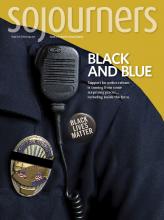A COUPLE OF YEARS AGO, while doing research on social privilege for an introductory ministry course, I came across an article titled “White Fragility.” Even a skim of the first few pages was enough to pique my excitement. In it, author Robin DiAngelo—an expert in multicultural education—describes in sociological detail a common set of defensive and destructive responses that people have when facing the reality of their own privilege.
I recognized each response she described from those my students had whenever I asked them simply to face—let alone begin to dismantle—the various forms of social privilege they each embody. Where, I began to wonder, could I squeeze this article into an already over-packed course syllabus? How could it best help us navigate the difficult issues we were trying to engage?
Emptying ourselves
Social privilege is a daunting topic to engage. When teaching it, I draw heavily on Peggy McIntosh’s now famous definition of its racial manifestation:
I have come to see white privilege as an invisible package of unearned assets that I can count on cashing in each day, but about which I was ‘meant’ to remain oblivious. White privilege is like an invisible weightless knapsack of special provisions, assurances, tools, maps, guides, codebooks, passports, visas, clothes, compass, emergency gear, and blank checks.
What McIntosh helps us see is that social patterns of privilege are maintained because people carry them about and use them while, at the same time, people are able to carry about and use their privilege because those social patterns are maintained. The effect is cyclical, and it happens without any of us being particularly aware of our own complicity in the system.
Society confers unearned gifts on people who embody particular privileged traits—straight, white, able-bodied, middle-class men, for example—while neglecting to confer them on others. This isn’t to say that people who embody more privilege are explicitly homophobic, racist, ableist, classist, or sexist. It doesn’t mean they don’t work hard for the goods they accumulate in life—of course, many do. It’s just that it feels perfectly natural to walk through an open door without ever noticing how it swings shut in the face of the equally hardworking genderqueer Latinx whose wheelchair wouldn’t even fit.
Read the Full Article

